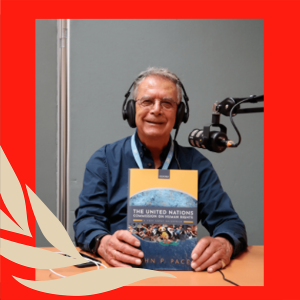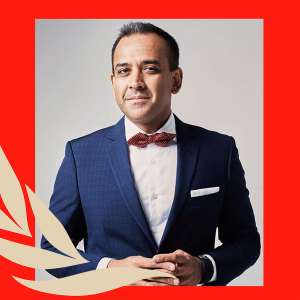The Next Page
Episodes

Friday Oct 30, 2020
Friday Oct 30, 2020
In episode 34, Dr. John Pace, former Secretary to the Commission on Human Rights and Coordinator of the Vienna World Conference on Human Rights joins The Next Page to share his knowledge in the field of human rights, while introducing his recently published book, The United Nations Commission on Human Rights, A Very Great Enterprise.
With more than three decades of experience in humanitarian work, Dr. Pace takes us back in time, with a special focus on the council that began it all: The United Nations Commission on Human Rights. Starting from its inception and moving through its ongoing evolution, he takes us on a journey along the Commission’s rich history and its role in the multilateral protection of human rights.
He also emphasizes the role of civil society in the discussion and advancement of human rights and multilateral cooperation, and considers the critical questions: how does a topic as universal and intersectional as human rights translate into global cooperation? And why are universal human values important? In this conversation, Dr. Pace richly informs us on a subject that is integral and invaluable to us all.
About Dr. John Pace
To learn more about his new book: https://bit.ly/3mynCdPThe e-version may also be found on most online book stores.
In the course of a career spanning over fifty years in the field of human rights, John Pace has been involved in a wide range of experiences in human rights and related institutional structures and procedures. Since leaving regular UN service in 1999, he has held senior positions in the human rights/humanitarian field in Liberia, Iraq, Lebanon, Palestine and Nepal. In the same period, he has worked in various other countries such as Indonesia, Sudan, Cambodia and Vietnam.
He has been involved in the establishment and management of most departments that currently make up the Office of the High Commissioner for Human Rights, such as Special Procedures, Technical Cooperation, and External Relations and in later years, the formation, or re-structuring of teams and management units. As a senior official, he played an important role in the design and restructuring of the Secretariat upon the creation of the Office of the High Commissioner for Human Rights (OHCHR).
He is currently Senior Visiting Fellow at the Faculty of Law, University of New South Wales, he also sits on the Board of the Diplomacy Training Programme. He is Adjunct at University of Sydney, School of Law.
Dr. John Pace on the Future of Human Rights Forum: https://bit.ly/3kE6a6Z
Dr. John Pace on civil society and the voyage of the great enterprise: https://bit.ly/31T79c8
Further Resources
Access the episode transcript here: https://bit.ly/35HUOsB
The UN Geneva Library & Archives also has a Research Guide on human rights! Find out more here: https://libraryresources.unog.ch/hrtimeline
Content
Speakers: John Pace & Karen Lee
Host & Editor/Producer: Karen Lee
Images: John Pace / Karen Lee
Social media designs and transcript: Karen Lee
Recorded & produced at the UN Geneva Library & Archives

Friday Oct 16, 2020
Friday Oct 16, 2020
In Episode 33, Ambassador Umej Bhatia, Permanent Representative of Singapore to the UN in Geneva and the UN in Vienna, joins The Next Page to speak about multilateralism from the perspective of a small state.
What kind of distinct importance does multilateralism and diplomacy have for small states? How does a rules-based multilateral order achieve global cooperation? How can small states turn vulnerability into opportunity? And, how have small states come together in the past and the present to further solidify their commitment to multilateralism? Ambassador Umej answers these questions and more, sharing insights from his years of experience not only as an Ambassador but also as an author and historian.
Ambassador Umej speaks about the various layers of multilateralism, from globalization, micro and macrolateralism to vaccine multilateralism. He also shares some insights on his new book, Our Name is Mutiny, a piece of creative non-fiction exploring the Singaporean experience between the years 1907 and 1915.
We hope you enjoy the conversation as much as we did!
About Ambassador Umej Bhatia
Beyond being Singapore's Permanent Representative to the UN, Ambassador Umej is also a writer, historian, Permanent Representative to the Preparatory Commission for the Comprehensive Nuclear-Test-Ban Treaty Organization and Resident Representative to the International Atomic Energy Agency in Vienna.To learn more about Ambassador Umej: https://bit.ly/34zvDaP
Ambassador Umej's Twitter: https://twitter.com/BhatiaUmej
Singapore UNOG Twitter: https://twitter.com/SGPMissionGva
To learn more about his new book: https://bit.ly/2HWBrnc
Further Resources
Access the episode transcript here: https://bit.ly/3j28XVU
The UN Geneva Library & Archives also has a Research Guide on multilateralism! Find out more here: https://libraryresources.unog.ch/multilateralism
Content
Speakers: Umej Bhatia & Francesco Pisano
Host & Editor/Producer: Karen Lee
Images: Arabian Business / The National
Social media designs and transcript: Karen Lee
Recorded & produced at the UN Geneva Library & Archives

Wednesday Oct 07, 2020
32: Historian Margaret MacMillan on the shaping of modern multilateralism
Wednesday Oct 07, 2020
Wednesday Oct 07, 2020
In Episode 32, historian, author and professor of history, Margaret MacMillan, joins The Next Page to share some of her insights on the makings of multilateralism as we know it today.
What are some of the roots of modern multilateral cooperation? How did individuals and institutions promote and build multilateralism, and how did they work to spread their ideas? What is the role of public opinion, and has this changed over time? Professor MacMillan shares some fascinating insights into these questions and more, looking at the beginnings of modern multilateralism in the 19th century, to the creation of the first global multilateral organization, the League of Nations, and the post-1945 era with the beginning of the United Nations. As we mark 100 years of multilateralism in Geneva, she also reflects on the evolution of multilateralism over the years, as well as a few thoughts on the multilateralism of the future.
As an avid reader and writer of many books on history, she also shares a glimpse of her most recent book, War: How Conflict Shaped Us, soon to be released on 6 October 2020, and a few tips on how she approaches the writing process. Hope you enjoy this listen as much as we did!
About Professor Margaret MacMillan
Margaret MacMillan is a Professor of History at the University of Toronto and emeritus Professor of International History and the former Warden of St. Antony's College at the University of Oxford. To learn more about her, visit: http://www.margaretmacmillan.com/Bio.php
To explore her full collection of books, including Paris 1919: Six Months that Changed the World (2001); The War that Ended Peace (2014); History’s People (2015); and War: How Conflict Shaped Us (2020), visit her website: http://www.margaretmacmillan.com/index.php
Further Resources
Access the episode transcript here: https://bit.ly/33gBtic
To find out more about 100 years of Multilateralism in Geneva, visit: https://multilateralism100.unog.ch/front
The UN Geneva Library & Archives also has a Research Guide on multilateralism! Find out more here: https://libraryresources.unog.ch/multilateralism
And, view some of Margaret MacMillan's books here at the Library: https://bit.ly/3456R24
Content
Speakers: Margaret MacMillan & Natalie Alexander
Host & Editor/Producer: Karen Lee & Natalie Alexander
Editorial Guidance: Pierre-Etienne Bourneuf, Scientific Advisor at UN Geneva Library & Archives
Images: Ander McIntyre
Social media designs and transcript: Karen Lee
Recorded & produced at the UN Geneva Library & Archives